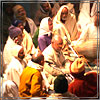Sign in to follow this
Followers
0

Sri Krishna Jayanti -- Celebrating Sri Krishna's Birthday
By
raga, in The Hare Krishna Forum
Rate this topic

By
raga, in The Hare Krishna Forum
Rate this topic